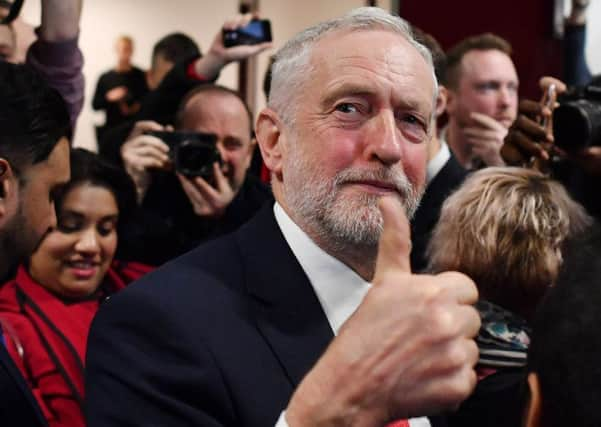Darren McGarvey: Sturgeon is wrong '“ Corbyn isn't the new Nigel Farage


In a stroke of genius, he decided to keep things light by broaching the subject of cheap foreign workers allegedly driving down British wages. His PR skills proved extremely effective: by the time he was finished, rather than mocking Richard Leonard’s slide-writer, everyone was arguing about whether Corbyn was racist.
While some Labour figures attempted to pin the spelling mistake on 10 years of falling standards in education, First Minister Nicola Sturgeon swooped in for the kill; framing Corbyn’s speech as deliberate mimicry of Question Time’s politician-in-residence Nigel Farage.
Advertisement
Hide AdAdvertisement
Hide AdSo, what did Corbyn actually say? His exact words were: “We cannot be held back, inside or outside the EU, from preventing employers being able to import cheap agency labour to undercut existing pay and conditions in the name of free market orthodoxy.”
I’m going to put my neck on the line and say that the emphasis here was clearly on exploitative employers as opposed to foreign workers. Drawing a false equivalence between Corbyn and Farage is knee-jerk and alarmist. Farage helped bring about the current political hell-hole, Corbyn is trying to function politically within it.
That said, the Labour leader is certainly guilty of evoking a ‘British jobs’ sentiment and it’s not the first time he – or his party – has done so. As far back as 2007, Gordon Brown, in his first speech at the Labour Party conference as Prime Minister was far less subtle when he claimed the UK would once again become a world leader in everything from renewables to manufacturing by “drawing on the talents of all to create British jobs for British workers”.
This was a sentiment he repeated on numerous occasions throughout that year whether addressing the GMB – where he said he wanted “to ensure that the jobs available in Britain are available for British workers” – or at the TUC where he managed to cram the words “British” or “Britain” several times into a single, long-winded sentence about jobs, the economy and the health service.
As with the fallout from Corbyn’s comments – not least in the Labour Party where many have distanced themselves from the remarks – Brown’s nationalist rhetoric caused many of his supporters and closest allies to wince back then too – though many kept their displeasure to themselves. The fact this has always been a thorny issue for Labour strategists is evident in how then Tory leader David Cameron chose to attack the party by comparing Brown (much like Sturgeon did with Corbyn) to the far-right.
This shows that Labour’s chances of getting into power decrease dramatically when they fail to triangulate the politically lucrative cross-section of voters for whom immigration is, to varying degrees, a live issue. What Corbyn may learn from Brown’s experience is that making conciliatory overtures to this demographic, who have entertained both UKIP and then the Tories in just a few years, is short-termism at its most unimaginative.
Any immediate political gains will dissipate the minute another party starts talking tougher on immigration. If Brexit goes ahead, as Labour seem to want, those communities it claims to be fighting for, in which anti-immigration sentiment has grown, will also be the most vulnerable to economic humiliation. No amount of pining for the glory days of empire will change that. Put brutally, the conditions that incubate anti-immigration feelings, from moderate concerns to barely concealed racism, are likely to get much worse.
Which is why, at the top level of politics, we need Corbyn to follow Sturgeon’s example: keep emphasising the positive case for immigration while refuting some of the myths that UKIP and Britain First have exploited to attract support. It’s not enough to stave this concern off by aping the Tories either. We need a deliberate shift in tone, to peel the left away from this intolerable race to the bottom where immigrants are concerned.
Advertisement
Hide AdAdvertisement
Hide AdHowever, when it comes to the grassroots activists, operating in communities, the approach, while rooted in the same principles, must be more nuanced and less idealistic in light of the unfortunate political reality we face. Persuading a significant number of people that immigration is not the root of the problem will involve a level of engagement with which many are uncomfortable.
Many, understandably, conflate all concerns about immigration with xenophobia and refuse to engage, regardless of the degree of concern expressed or the downtrodden socio-economic context in which these views often emerge.This is where some SNP figures, like John Nicolson, can come off sounding a little smug when they parrot “you’re all welcome in Scotland” platitudes so popular among SNP Remainers. It’s on the ground, in communities characterised by poverty, that activists will need to challenge the myths – and acknowledge some of the challenges – around immigration policy.
This is where we should be taking our lead from some on the radical left. Whether challenging dodgy landlords, shyster employers and zero-hours contracts or dragging trade unionism kicking and screaming into the 21st century, groups like Living Rent and Better Than Zero are visible in communities, not only fighting for people and supporting them, but crucially, gaining a deeper understanding of why people arrive at a position of antagonism towards immigration.
Only by organising outwith political parties can we create mechanisms through which communities can begin to leverage power, bring exploitative employers to heel and have a say in decision-making that affects them. It’s only by talking to people with views we find disagreeable that we can hope to persuade them otherwise.
